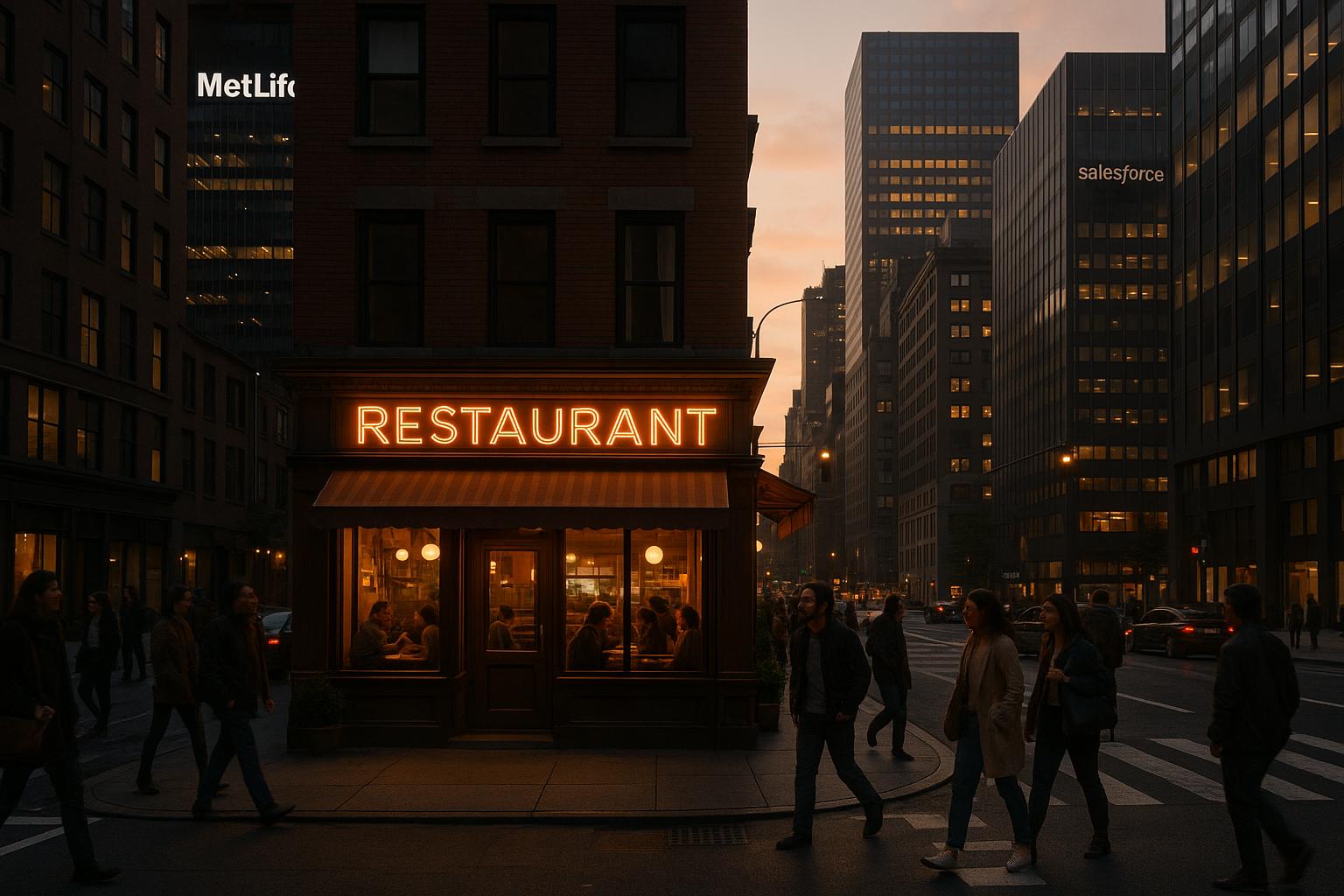How can a small business in NYC compete with big brands? By leveraging local SEO. This case study follows Bella’s Authentic Italian Kitchen, a small Italian restaurant in Brooklyn, as it used local SEO to go from struggling to thriving – without a massive budget.
Key Takeaways:
- Problem: Bella’s lacked online visibility, ranking poorly in local searches like "Italian restaurant Park Slope." Revenue was $18,000/month, far below the $32,000 needed to break even.
- Solution: A targeted local SEO campaign focused on optimizing its Google Business Profile, using hyper-local keywords, managing customer reviews, and fixing inconsistent business information.
- Results: Bella’s achieved higher search rankings, increased website traffic, and grew monthly revenue to sustainable levels by connecting with local customers.
This case proves that small businesses can compete effectively with larger brands by focusing on local SEO basics like accurate online profiles, engaging content, and customer feedback management.
Case Background: NYC Small Business Before Local SEO
The Small Business Profile
Say hello to Bella’s Authentic Italian Kitchen, a cozy, family-run trattoria that opened its doors in Brooklyn’s Park Slope neighborhood in January 2022. Owner Maria Rossi poured $85,000 into creating this 28-seat restaurant, inspired by her grandmother’s cherished recipes.
Located on 7th Avenue, just a short walk from Prospect Park, Bella’s occupied a 1,200-square-foot space. Maria employed six staff members: two full-time cooks and four part-time servers. Her goal was to attract local residents, young professionals, and families craving authentic Italian dishes – without the hefty Manhattan price tag.
However, Bella’s digital footprint was almost nonexistent. The restaurant had a bare-bones, one-page website, no Google Business Profile, and zero online reviews. Maria relied solely on word-of-mouth buzz and a sidewalk sign to bring in diners. The result? Monthly revenue hovered around $18,000 – far below the $32,000 needed to break even.
When people searched online for "Italian restaurant Park Slope", Bella’s didn’t even show up. Its lack of visibility meant it was missing out on a huge pool of potential customers.
Main Challenges Identified
Maria quickly realized she was up against some tough competition. Within six blocks of Bella’s, there were several well-established players, including Olive Garden, Carmine’s, and three other Italian restaurants with over a decade of history in the neighborhood.
The biggest issue? Bella’s was invisible in local search results. When people typed in phrases like "Italian food near me" or "best pasta in Park Slope", competitors like Don Antonio and L’industrie Pizzeria dominated the search results. Their profiles boasted hundreds of glowing reviews and polished photos, leaving Bella’s completely overshadowed.
Maria also faced a tight marketing budget. She could only allocate $500 per month for all her promotional efforts, while her competitors spent thousands on Google Ads and social media campaigns. Traditional advertising options like newspaper ads or radio spots were simply out of reach.
On top of that, Bella’s had inconsistent business information scattered across the few online directories it appeared on. Incorrect phone numbers, outdated hours, and mismatched business names caused confusion for anyone trying to find or contact the restaurant.
Maria’s limited advertising efforts, which included local flyers and sponsoring community events, came with steep customer acquisition costs – about $47 per new diner. This approach was draining her already tight cash flow and wasn’t sustainable long-term.
With so many obstacles, Maria needed a solution that was both cost-effective and highly targeted. That’s when she decided to launch a local SEO campaign.
Local SEO Campaign Objectives
By September 2022, Maria knew she had to act fast. She teamed up with a local digital marketing consultant to kick off a focused local SEO campaign. The main goal? Boost monthly revenue to $32,000 within six months to finally break even.
The campaign zeroed in on three key objectives:
- Rank in Google’s Local Map Pack for search terms like "Italian restaurant Park Slope", "pasta near me", and "authentic Italian food Brooklyn." This would level the playing field with her larger competitors by improving Bella’s visibility in local search results.
- Collect 100 genuine customer reviews on Google and Yelp within four months. Maria knew reviews were critical for building trust with potential diners. The goal was to achieve an average rating of at least 4.5 stars.
- Drive a 300% increase in website traffic and boost foot traffic during slower times, such as weekday lunches and early dinners. The team aimed to bring in 1,500 monthly website visitors (up from 400), generate 50 phone calls per month from online searches, and increase the percentage of customers who found Bella’s online from 2% to 25%.
Maria committed to investing $800 per month in this six-month campaign, understanding that this upfront expense was necessary to stay competitive in Brooklyn’s bustling restaurant scene. By focusing on local SEO, she hoped to turn Bella’s into a go-to spot for Italian food in Park Slope.
156% Increase in Phone Calls – Local SEO Case Study – #seocasestudy
Local SEO Methods That Worked
Bella’s digital marketing consultant revamped its online presence with a focused local SEO strategy to compete with established Park Slope restaurants, all while staying within a limited budget.
Google Business Profile Optimization
The first step was creating and fully optimizing Bella’s Google Business Profile. Every section was meticulously completed, ensuring a 100% profile setup – an often-overlooked factor that can heavily influence rankings.
The team chose "Italian restaurant" as the primary category rather than the broader "restaurant" option. This specific categorization helped Bella’s show up in searches like "Italian food Park Slope" and "authentic pasta Brooklyn." Secondary categories, including "Pizza restaurant" and "Wine bar", were added to capture additional search traffic.
To make the profile visually appealing, 15 professional photos were uploaded, showcasing Bella’s enticing dishes and its cozy interior. About 60% of these images highlighted food, with the rest capturing the restaurant’s ambiance and exterior.
The business description was written to naturally include phrases like "authentic Italian cuisine", "family recipes", and "Park Slope neighborhood." Instead of overloading it with keywords, the description spoke directly to potential customers: "Experience authentic Italian flavors in the heart of Park Slope, where traditional family recipes meet Brooklyn’s vibrant dining scene."
Weekly Google Posts were used to highlight specials and customer testimonials. Posts included location-specific hashtags like #ParkSlope and #Brooklyn, reinforcing Bella’s local relevance in Google’s algorithm.
The Q&A section was also prioritized. Common questions about parking, dietary options, and reservations were answered promptly, with new inquiries addressed within 24 hours. This active engagement signaled both to customers and Google that Bella’s was highly responsive.
With the Google profile in top shape, the next focus was refining Bella’s content using targeted local keywords.
Local Keyword Research and Content
The consultant carried out detailed keyword research, zeroing in on hyper-local terms that reflected how Park Slope residents searched for dining spots. The goal was to identify terms with lower competition but strong conversion potential.
Key phrases included "Italian restaurant Park Slope", "authentic pasta near Prospect Park", and "family Italian dining 7th Avenue Brooklyn." Mobile-friendly and conversational keywords were prioritized to align with voice search trends.
Bella’s website underwent a complete content revamp. New pages were created, such as "Italian Dinner Park Slope" and "Weekend Brunch Near Prospect Park", each tailored to specific keywords. Titles like "Authentic Italian Restaurant on 7th Avenue | Bella’s Park Slope" incorporated neighborhood references to boost local relevance.
The blog became a powerful tool for local SEO. Monthly posts, with titles like "5 Perfect Date Night Spots Around Prospect Park" and "Where to Find the Best Tiramisu in Brooklyn," positioned Bella’s as a go-to resource for local dining. These posts naturally integrated target keywords and attracted backlinks from neighborhood blogs.
To optimize for voice search, conversational phrases were used in headers and content. For example, one subheading asked, "Where can I find authentic Italian food near me?" and provided a helpful answer that highlighted Bella’s location and menu.
Adding Local Business Schema Markup
Technical SEO played a key role in helping search engines better understand Bella’s services and location. The consultant implemented structured data (schema markup) across the website, ensuring Google could easily interpret and display relevant information in search results.
Schema markup included details like business hours, price range, accepted payment methods, and precise geographic data to improve map placement. It also clearly identified Bella’s as an Italian restaurant in Park Slope.
Menu schema markup proved especially beneficial. Menu items were structured with prices, descriptions, and dietary details, making Bella’s eligible for rich search snippets. For example, a search for "gluten-free pasta Park Slope" could display Bella’s gluten-free options directly.
Review schema markup was added to showcase star ratings in search results, boosting click-through rates by immediately establishing credibility. FAQ schema was also implemented to address common queries about reservations, parking, and menu options, helping Bella’s appear in featured snippets for searches like "Do Park Slope Italian restaurants take reservations?"
These technical updates laid the groundwork for consistent online citations.
Building Local Citations and NAP Consistency
To strengthen Bella’s online presence, ensuring consistent Name, Address, and Phone (NAP) information across directories was essential. The consultant discovered discrepancies, such as outdated phone numbers and variations in the business name, which were promptly corrected.
A thorough citation audit identified opportunities across a range of directories. High-authority and neighborhood-specific platforms were prioritized to reinforce Bella’s local identity.
Listings were secured on industry-specific platforms like Zomato, Grubhub, and DoorDash, even though Bella’s didn’t initially offer delivery. Claiming these profiles prevented competitors from occupying the listings while adding citation value.
To maintain accuracy, a citation tracking spreadsheet was created, and monthly audits were conducted to catch and fix any inconsistencies that could harm local search rankings.
Customer Review Management
To rebuild Bella’s reputation, a thoughtful review strategy was seamlessly integrated into the dining experience.
Table tent cards with QR codes directed customers to Bella’s Google Business Profile review section. A friendly prompt – "Loved your meal? Share your experience with fellow Park Slope food lovers." – encouraged patrons to leave reviews without feeling pressured.
Follow-up email campaigns targeted guests who shared their contact information during reservations or events. Automated thank-you emails, sent 48 hours after dining, included a direct review link and emphasized Bella’s community connection.
Maria, the owner, personally responded to reviews within 24 hours, adding local touches to her replies. For negative feedback, she focused on addressing concerns and inviting customers to return for a better experience.
A simple spreadsheet tracked review volume and sentiment. Recurring praise, like compliments on homemade pasta, informed future marketing efforts, while constructive criticism highlighted areas for operational improvement.
Ethical practices were strictly followed – no discounts were offered in exchange for reviews. Instead, Maria created a "Customer Appreciation Wall", featuring printed reviews (with permission) to celebrate loyal diners and inspire organic word-of-mouth promotion.
Results: What the Small Business Achieved
The results speak for themselves: Bella’s went from being a hidden gem to becoming one of the most sought-after Italian dining spots in the area – all thanks to a well-planned local SEO campaign.
Improved Local Search Visibility
By focusing on hyper-local keywords, Bella’s made a significant leap in search rankings. Local diners searching for Italian cuisine could now easily find the restaurant online. This boost in visibility not only increased website traffic but also made Bella’s a go-to choice for Italian dining in the community. The stronger online presence bridged the gap between Bella’s and its potential customers.
Enhanced Customer Engagement and Community Recognition
Customers began to notice and appreciate having accurate, up-to-date information – like operating hours and menu options – readily available in search results. This transparency fostered trust and encouraged more word-of-mouth recommendations, which brought in new diners and kept loyal customers coming back. Bella’s consistent efforts to keep its online information accurate also helped solidify its reputation as a reliable, top-tier Italian restaurant in the local area.
The campaign successfully achieved its goals of improving search rankings and boosting customer interaction. These results underline how an effective local SEO strategy can transform a small business, enhancing both customer engagement and standing within the community.
Key Takeaways: What Small Businesses Can Learn
This case study highlights practical lessons that small businesses can use to improve their local online visibility and compete in NYC’s demanding market.
Tackling Common Local SEO Challenges
Tight budgets? No problem. Creating location-specific content, maintaining a complete Google Business Profile, and responding to reviews quickly can deliver noticeable results without breaking the bank.
Limited resources? Focus on tasks that make the biggest impact first. For instance, prioritize mobile optimization – since 92% of NYC searches happen on smartphones, having a fast, mobile-friendly website can significantly boost your rankings.
Feeling overshadowed by big corporations? Don’t let it stop you. Nearly 46% of all Google searches are for local information, which means many people are actively looking for businesses nearby. This gives smaller businesses a chance to shine by catering to hyper-local needs.
Even in Manhattan’s crowded market, mastering the basics of local SEO can help small businesses stand out. Bella’s success story proves that focused, low-cost strategies can help overcome even the toughest competition.
These foundational efforts lay the groundwork for using specialized local SEO tools effectively.
Local SEO Tools and Resources
SearchX offers powerful local SEO tools designed to be affordable for small businesses. Their keyword research tools can identify neighborhood-specific, high-conversion search terms to target.
Their free Google My Business audit tools are especially helpful. They flag incomplete profile sections, missing categories, and outdated details that could be holding back your local search performance.
For the technical side of SEO, schema markup generators make it simple to create the proper code for local business schema. You don’t need to know how to program – this structured data helps search engines understand your business better, improving how your information appears in search results.
Citation tracking features are another game-changer. These tools automatically monitor your business listings across the web to ensure your Name, Address, and Phone (NAP) information stays consistent everywhere. This reduces confusion for both customers and search engines.
Building Long-Term SEO Success
Consistency is the secret to long-term local SEO success. While NYC businesses often see results within 60–90 days, maintaining those gains requires regular updates to your Google Business Profile, content, and citations.
Engaging with your local community pays off in the long run. Partnering with nearby businesses, sponsoring events, or getting mentioned in neighborhood blogs can generate valuable local backlinks and strengthen your community presence. These efforts can also lead to referrals and collaborative marketing opportunities.
Managing reviews effectively is another key piece of the puzzle. Responding to reviews within 24–48 hours shows that you’re actively engaged with your customers, which encourages more positive feedback.
Keeping your website updated is equally important. With 53% of website traffic coming from organic search, adding fresh content – like local news, seasonal promotions, or event coverage – signals to search engines that your business is active and relevant.
Don’t forget to monitor your site’s mobile performance regularly. Search engines increasingly prioritize mobile-friendly experiences, so even small improvements can make a big difference in local search rankings.
Ultimately, local SEO isn’t a one-time effort. Businesses that stay consistent, engage with their community, and maintain an active online presence tend to see the best results over time. It’s about building momentum and letting those efforts compound into lasting success.
Conclusion: Local SEO Success for Small Businesses
Bella’s Authentic Italian Kitchen’s journey from struggling to thriving is a testament to what happens when you focus on the basics of local SEO. Their transformation into a neighborhood favorite highlights the power of strategic, consistent efforts over having the biggest budget.
By refining their Google Business Profile, using hyper-local keywords like "authentic Italian dishes Park Slope," and staying on top of customer reviews, Bella’s carved out a strong local presence. This approach made them a go-to spot in their area, proving that even small businesses can compete effectively against larger competitors.
This case study shows that these strategies aren’t out of reach – they’re accessible to any small business owner willing to dedicate the time and effort. Local SEO isn’t just about surviving; it’s about thriving by connecting with nearby customers who are already searching for what you offer.
The key takeaway? Success in local SEO lies in understanding your community, showing up where it matters most, and consistently providing value – both online and in person. With the right tools, like SearchX, and a clear focus on local needs, small businesses can turn their size into an advantage and stand out against much larger players.
The roadmap is simple: stick to the fundamentals, stay consistent, and remember that being the best local choice often beats being the biggest name in the game.
FAQs
How can small businesses in NYC use local SEO to stand out against larger competitors?
Small businesses in NYC have a unique opportunity to stand out in a bustling market by honing in on local SEO strategies that resonate with their community. A great starting point is optimizing your Google Business Profile. Make sure all the details – like your address, phone number, and business hours – are accurate and current. This helps potential customers find you easily and builds trust.
Incorporating local keywords into your website content and meta descriptions is another smart move. Think about the phrases your nearby customers are likely searching for and weave them naturally into your content.
Don’t overlook the power of customer reviews – encourage satisfied customers to leave feedback and take the time to respond to reviews. Positive reviews not only enhance your reputation but also improve your visibility online.
Finally, ensure your website is ready for today’s mobile-first world. It should load quickly, be easy to navigate on a smartphone, and include location-specific content that speaks directly to your local audience. By focusing on these tactics, small businesses can carve out a strong presence and compete effectively, even in a crowded market like NYC.
How did Bella’s Authentic Italian Kitchen boost their online visibility and grow their revenue using local SEO strategies?
Bella’s Authentic Italian Kitchen boosted their online presence and saw a noticeable rise in revenue by applying smart local SEO tactics. They fine-tuned their Google My Business profile, ensuring all business details were accurate, uploading high-quality photos, and keeping the profile updated regularly. On top of that, they focused on local keywords that matched their neighborhood and Italian cuisine, aligning their website and content with what nearby diners were actively searching for.
To make their business information more accessible to search engines, they implemented local business schema markup, which helped improve their visibility online. They also encouraged happy customers to share glowing reviews on platforms like Google and Yelp. These reviews not only built credibility but also helped push their rankings higher in local search results. By combining these efforts, Bella’s managed to stand out in a crowded market and draw in more local patrons.
What challenges do small businesses face with local SEO, and how can they succeed on a tight budget?
Small businesses often face hurdles with local SEO because they lack time, resources, and often have to compete against much larger companies. These challenges can include navigating the complexities of SEO, maintaining a strong online presence, and earning customer trust.
To tackle these obstacles, it’s smart to focus on simple, impactful strategies that won’t drain your budget, such as:
- Optimizing your Google Business Profile: Make sure your details are accurate, and include high-quality photos that represent your business well.
- Consistency in online directories: Ensure your business name, address, and phone number are the same everywhere online.
- Creating community-focused content: Develop content that speaks directly to the interests and needs of your local audience.
- Encouraging customer reviews: Ask happy customers to leave reviews and take the time to respond to them – this builds trust and credibility.
By concentrating on these steps and leveraging affordable tools or outsourcing where necessary, small businesses can boost their local visibility and stand out, even in competitive markets.




